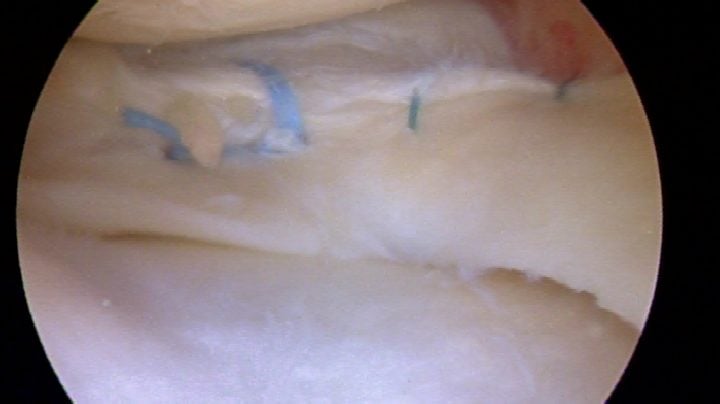
Meniscus tears are a very common injury. Since many people over 50 will have one and many more over 70 will have one it is normal to wonder if a meniscus tear can heal without surgery.
Yes, some meniscus tears can heal on their own. Perhaps even more important, even if a meniscus tear doesn’t heal, many tears will stop hurting if treated without surgery. It is just as important to understand that many meniscus tears do not require surgery. What? Really? Yes… most meniscal tears are degenerative and will not require surgery.
Over the last 5 years, there have been many scientific studies showing that the pain from a degenerative meniscus tear has the same chance of going away with surgery or physical therapy. Other papers show that your risk of needing a knee replacement increase if you have surgery to remove the torn pieces. Some of you are under the misconception that having surgery now will prevent knee arthritis. That is simply not true. A more recent study on meniscus tears showed that surgery had the same result as sham surgery. That means that some people were put under anesthesia, had two little cuts made in their skin, but the meniscus was not treated. Those people had the same chance of feeling better as those who had the actual surgery.
So, to recap:
Surgery increases your risk of needing a knee replacement. Physical therapy has been shown to often have the same effect as surgery. Sham surgery usually works just as well as the actual surgery. Surgery is one heck of a placebo.
Yes, some tears will not heal. Some tears will continue to hurt. Surgery may become a reasonable option for some people. But meniscus surgery should not be near as common as it is today.
Some tears, particularly those in athletes or meniscus tears that occurred due to trauma will require surgery. Most acute meniscus tears should be sutured or repaired. Healing after a meniscus repair is becoming more successful with better techniques. Many tears were deemed non-repairable decades ago. Many of those tears can now be repaired with a reasonable chance of success.
The meniscus is a “C”-shaped cartilage disk in the knee. There are two menisci within each knee. A normal meniscus serves a very important role as a shock absorber and as a stabilizer. When a meniscus tears, it can lead to pain, instability, locking and it can lead to osteoarthritis over the long term. Staying active and staying in the game is important … so getting a meniscus tear to heal may be very important to you.
Whether or not a meniscus tear can be fixed, and whether or not a meniscus tear might heal depends on the type of tear and the cause of the tear.
As a surgeon, I look at the cause of your meniscus tear and the type of meniscus tear you have. Once I know what type of tear you have I can determine if your meniscus tear will heal on it own, or if it might require surgery to help it heal.
There are different types of meniscus tears:
There are different causes of meniscus tears.
Acute injuries can cause meniscus tears (longitudinal, peripheral, bucket-handle and radial tears) …
but most meniscal tears (complex, degenerative, and horizontal cleavage) are caused by degeneration and wear and tear.
Healing of a Meniscus Injury
The meniscus serves a very important function. Therefore, now more than ever, we try to focus on meniscus preservation or healing. That means our goal is to try and fix or suture your tear so that it will heal. Be careful, occasionally a surgeon might tell you they will “fix” your meniscus … but they are actually intent on cutting the torn portion out. Be sure to clarify this with them before considering which surgeon should repair your meniscus tear. I should also state that we are not talking about treating highly degenerative or worn out tears in people in their 7th and 8th decades. Those tears are not repairable and most usually do not need to be operated on. Most people with degenerative tears will do very well with a compression sleeve and physical therapy and moderate exercise.
Can my meniscus tear be repaired?
Over the past few years, a lot of research has focused on the healing potential of certain tears we once thought would not heal. We know that the peripheral ⅓ of a meniscus has a blood supply adequate enough to bring healing nutrients to the area of the tear. Therefore, it was always assumed that only tears within the outer ⅓ of a meniscus would heal once they were sutured or stitched back together. Recent research has shown that tears with little blood supply are still capable of healing after they have been sutured together. Horizontal cleavage tears were once considered a degenerative tear not capable of healing. This paper and others show that horizontal cleavage tears can be repaired, with a reasonable chance of success. Radial tears of the meniscus were also considered not repairable, and most surgeons would simply cut out the torn portion, leaving you at risk for developing osteoarthritis. This paper shows that we are now capable of fixing radial tears of the meniscus, again with a reasonable chance of healing.
Can Meniscus Tears Heal Without Surgery?
When you first started reading this you were likely reading to see if your tear could heal on its own — without the need for surgery. In a very small group of people that can happen. Meniscus tears that heal themselves tend to be traumatic tears which occur at the same time you tear your Anterior Cruciate Ligament or ACL. Otherwise, most tears do not heal unless they are sutured back together.
Bottom Line: The meniscus serves a very important function within our knee. When a meniscus tears, it will not serve to protect your knee from developing osteoarthritis. Many tears are now repairable with modern techniques. If these repairs are successful at restoring the integrity of the meniscus, then you may not go on to suffer the consequences of an arthritic knee.
Repairs are generally reserved for acute, traumatic tears in children and young adults. Surgery for degenerative meniscus tears in adult knees with osteoarthritis is rarely required. Although your degenerative tear will not heal spontaneously, physical therapy and other non-surgical measures are usually effective at minimizing pain and maximizing function as effectively as surgery.
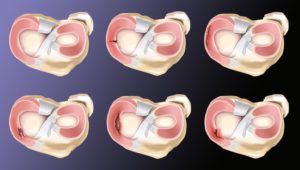
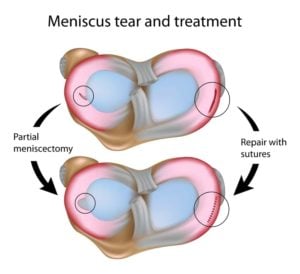



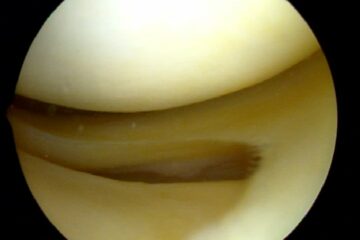

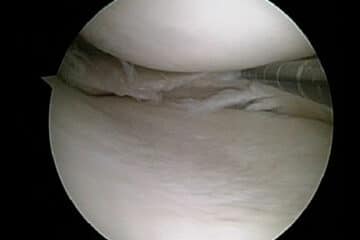








Hi Dr Lukes, I’m a 16 year old female, who is extremely active. I go to college to play football (in the UK) so I am supposed to be training and playing 5 times a week however I am currently not participating in any physical activity. The injury occurred I was playing on artificial grass and my foot was planted in the ground and then a player from the opposite team came through my knee at a side angle and as a result, I spun out of the tackle. I came off and it immediately started to stiffen up but didn’t think too much about it as I’ve had other knocks before that I’ve been able to walk off and be fine but I notice the next day that I had severe pain when weight-bearing so I rested it and applied ice whilst elevating it for a couple of weeks and then went to see my doctor and got referred for an MRI. I’ve had an MRI now which showed a tear in my posterior medial meniscus. I’ve been resting for at least 12 weeks now and it still hasn’t healed so I’ve got an appointment with an orthopedic surgeon do you think I will have to have surgery as I’m young and it’s preventing me from being active and play football.
Many thanks, Katie.
HI Katie… I’m sorry to hear that this has set back your football training! It seems like you have tried everything to allow this to heal. At your age it is a logical choice to have it repaired if the pain persists and if your surgeon believes your pain is coming from the tear.
Good luck to you!
Hi Dr. Luks,
Thanks For a very informative article. I am not 43 years old and when I was 15 I had a meniscectomy as a result of a meniscus tear whilst practicing Tae Kwon Do. It took me a year to recover but since then I have regularly practiced sport and football (soccer) in particular. I have always had a mild pain after exercising or depending on the weather but in the last few years it has intensified. The way I responded to it is by loosing some weight (c. 1 stone) and wearing in soles in all my sport shoes. However the pain is still present and maybe a bit more intense than before. Generally when the knee warms up I don’t feel it but I feel it later when the adrenaline effect goes. In the last few years I have done various MRI scans / X-rays and seen few specialists. Whilst my meniscus isn’t in too bad of a shape although damaged, I also have a lateral bulge which has some liquid trapped in it that is let in and out of it. So I was wondering if there is anything else I could do to lower the pain other than managing my effort? I still enjoy running and I want to be able to do it as long as I can. Thanks.
Hi Pierre… Those lateral parameniscal cysts can certainly bother people. They tend to sit under the ITB tendon and the pressure is what hurts.
There are different ways to deal with these… but that depends on what your exam is, what your xrays and MRI scans show. These cysts are almost always in association with a horizontal lateral meniscus tear. Depending on what everything else looks like we might choose to fix the tear, which closes the entrance to the cyst.
But without seeing people in the office I really cannot comment further on what might be the most appropriate step for you.
Hi Dr. Luks,
I had a collision while playing football on my ankle but the pain resulted in my knee. When i visted my Dr he suggested me to take an Xray and MRI and the Xray seems fine and MRI show a mensicus tear.
The finding in the MRI is : “Grade-II horizontal intrameniscal signal in posterior horn of medial mensicus” will this be recovered without surgery. My Dr suggested to go for an Arthroscopy immediately. I took a second opinion and the Dr told me I will be fine as I dont have any locking or movement issues in my knee apart from minimal effusion. Is this meniscus tear will heal its own or have to go for surgery ?
Good morning
Than you for the informative article. I am an active 65 year old woman, 70 days ago after a long day of climbing ladders my knee felt stiff, within 5 days the pain was excruciating, I could not weight bear or bend my knee. I went to the ER and was told there was nothing wrong. A few days later I went to see and Ortho and again he said, nothing wrong. The third week I begged for an MRI, the results are as follows: small complex partial tear at the posterior horn root junction. Globular intermediate degenerative signal throughout the posterior horn of the medial meniscus without MRI criteria tear. The meniscus is extruded. There is a low signal no displaced sunchrodral fracture of insufficiency with edema like signal at the weight bearing medial tibial plateau. Extensive horizontal cleavage tear of the lateral meniscus, mild proximal patellar tendinosis,low grade patellar chondrosis. My doctor put me on 600mg ibuprofen 3 x’s a day along with two 500mg of Tylenol. It has done nothing for the pain. I use a cane and/or a walker to get around. After 70 days of unrelenting pain and no sleep, can something be done or do I need to find another Ortho.
Thank you.
These stress fractures can be a bear. There are other ways to treat them, both with medications and occasionally with surgery. I would consider seeing a second opinion.